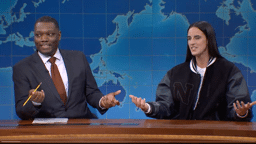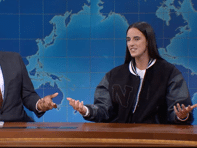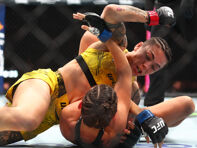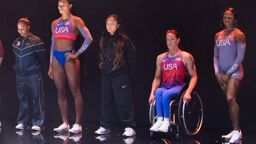By George Zeno
I've seen comments on social media about the relevance of Jason Collins announcing that he is gay, claiming that he shouldn't make something that is personal a public matter. Some people have stated that it doesn't change anything and that it is a selfish move. You also have critics who are preaching about the “sin” of homosexuality. I feel the need to address these views. I share some of his identities, so I take their criticism personally.
Breaking barriers in sports means something, particularly for people in the minority. Sports have been used many times to bring attention to macro-level social issues and to foster social change — particularly integration of Blacks during segregation and the Jim Crow era; and more recently, equal pay for women with tennis leading the way.
Legendary UCLA basketball coach John Wooden declined invitations to national basketball championship tournaments because of a ban of Black athletes, forcing the hands of the tournaments to change their policies during the 1940s and '50s. Many Southern schools refused to play Northern schools in football because the teams from the North were integrated. In fact, LSU didn't play a non-Southern school in football from 1942-70 due to Black players participating on Northern teams.
BYU faced similar issues because the Mormon church did not allow Black men into the lay priesthood, thus Blacks were not qualified to make it to the highest level of the “celestial kingdom;” as Brigham Young cited, Blacks were the seed of Cain whose seed was turned to black as the Lord's curse. This doctrine held steady at BYU until students at competing schools began forcing their universities to cancel athletic events with BYU and the pressure built up from the NCAA, BYU alumni and later from the IRS. This, along with another major factor (the Church’s expansion in South America couldn’t guarantee the exclusion of the mixed race mulattos from priesthood), led to a “revelation” in 1978 by the Church’s president, Spencer Kimball, to allow Blacks full entrance into the Church and kingdom.
We don't need to go into the Jackie Robinson stuff, right?
Jason Collins is a basketball player. He plays in a league that millions of boys and girls around the world idolize and create heroes and role models. I'm certainly not saying this arena has created a prolific amount of outstanding citizens, but role modeling and worshiping of these athletes still occurs.
Jason Collins is gay … and Black. The stigma of being LGBT in Black communities runs deep. Black gay youths have very few people who look like them in the public sphere. In addition, there are Black churches that preach fire and brimstone for being gay as though loving someone is equivalent to, or even worse ,than murder. This isolation and condemnation results in many youths attempting and oftentimes succeeding at suicide because they don't feel they fit in, are told that God doesn’t love them (or their sin), and are bullied or beaten to the point of despair.
These processes also drive a dangerous underground “down-low” culture in Black communities that drives HIV and other STDs to our young men and women. Black women are contracting HIV faster than any other heterosexual group (92% of women living with HIV are black). Jason’s announcement has now placed Black, gay and male on the front pages and in most every news feed in America, forcing open the doors of conversation in Black communities about sexuality and identity to the forefront.
Ignoring the achievement of what Jason has done because one doesn't see sexual identity as a factor or because one thinks those things are better kept private or kept hidden is to make that identity invisible and inferior. These views validate the notion that Black, gay identity is unique to the individual, and thus only impact that individual. This leaves many to think they are "the only ones" in a struggle for self-love and affirmation. It's simply not true.
With the ending of the ban on gays and lesbians serving openly in our armed forces and the door being opened to women to serve on submarines and fully on the war front in combat, one can argue that the professional men’s leagues of the “Big 4” (NHL, NFL, NBA and MLB) are the last spaces of traditional male masculinity. These sports anchor the American imagery of the idolized heterosexual man. Sharing this space, especially the intimacy of the locker room, with someone with a different sexuality is to turn upside down the damaging stereotypes that have long been held regarding gay men. While other pro athletes prior to this moment – people like Dave Kopay, Wade Davis, John Amaechi, Esera Tuaolo and, most recently, Kwame Harris — all retired before coming out, Jason’s public announcement of his sexual identity stands to challenge these traditional spaces, boundaries and definitions.
Jason has been given a platform (NBA) and he's doing something with it by making his marginalized identity public. Many of the athletes in the NBA are criticized as deadbeat dads, drug users, or whatever negative stereotype one may conjure about them; Jason is being criticized for speaking his truth. While some of these same athletes will join the choir of his critics, Jason is going to be held up by many of the same for being open, honest, Black, gay and a baller.
Whether his critics believe his identity is morally wrong or not, they can decide on their own, but denying the importance of this barrier-breaking moment is to deny the opportunity for a young person who shares Jason's identities to feel supported and affirmed while launching the Black communities into an overdue discussion about sexuality, masculinity and identity.
Yes, I care whether Jason can rebound and drive to the hoop or not — I'm a basketball fan. But I also care that he has taken ownership of his identity and I respect that there is weight that comes along with being the "first." Jason has many more hills to climb. He has to defend his masculinity, address being openly gay in a locker room, and educate some men that just because they have penises do not qualify them as a sexual target or love interest. It's not an easy rock to carry and having people support Jason in a public manner can make carrying that rock a little bit easier.
George Zeno is a former athlete and high school coach. He is now an administrator at the University of California, Berkeley. He previously was an administrator at the University of Washington. He can be reached via email at: [email protected] or on facebook: fb.com/iamzeno







































